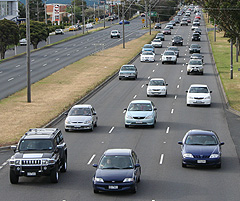Make / Model Search
News - General News - EmissionsIndustry ready to fight CO2 standardsDouble dip: The Australian car industry fears that potential CO2 emissions restrictions will be applied on top of a carbon trading scheme impost. Mandatory CO2 limits would be a double burden, forcing up prices, says FCAI1 Jun 2009 By IAN PORTER THE car industry is preparing to fight attempts to impose mandatory CO2 emissions standards on top of penalties that would come with the Australian government’s proposed emissions trading scheme. Public servants are believed to be preparing to recommend to federal and state ministers that there is a prima facie case for the imposition of fuel efficiency and/or emissions standards in Australia. The ministers are scheduled to meet on July 2 at the next Council of Australian Governments (COAG). Federal Chamber of Automotive Industries (FCAI) chief executive Andrew McKellar said the industry would strongly take issue to such a recommendation. He said separate emissions standards on top of the proposed emissions trading scheme would only increase costs unnecessarily. “Mandatory emissions standards would overlap with an emissions trading scheme (ETS) and only lead to significantly higher costs across the industry for the same outcome,” he said.  The government could sensibly have only one measure or the other, he said. The government could sensibly have only one measure or the other, he said.“Certainly, the industry supports the introduction of an ETS. It is far preferable to the option of mandatory emissions standards. The costs that would be incurred going down the mandatory regulation route would be far higher. “It would be a far less cost effective way of achieving the same sort of carbon emission abatement outcome.” Mr McKellar said a regulation impact statement would have to be compiled to evaluate the benefits or otherwise of any proposed emissions standards. He cautioned against making simple comparisons between the emissions standards imposed in Europe and, more recently America, and the voluntary limit of 222 grams a kilometre being pursued in Australia. The limit of 120g/km about to be imposed in Europe applies only to passenger vehicles, whereas the target in Australia includes SUVs and LCVs. Mr McKellar said the European emissions trading scheme did not include road transport in its ambit, unlike the ETS that the Australian government was attempting to shepherd through parliament. This means fuels and associated processes emitting carbon would be taxed to curb their use and thus reduce carbon emissions. In the US, where President Obama recently laid out a plan to increase fuel economy standards, there is no emissions trading scheme. “There is a lot of confusion around caused by people trying to compare the standards in Europe and the US with the voluntary targets we have here,” Mr McKellar said. “It’s not just a problem of converting from miles a US gallon to litres per 100 kilometres.” He said various authorities in the US used different driving cycles when calculating the fuel economy of vehicles. The drive cycle is the mixture of city and freeway running assumed to be part of a car’s normal use pattern, and the assumptions in the cycle can alter the fuel consumption sharply. Mr McKellar said the drive cycle used to measure vehicles in the Corporate Average Fuel Economy (CAFE) test used in the US was not even made public. The US Environmental Protection Agency (EPA) did publish the drive cycle it uses, but it was unique. Mr McKellar said Europe had been able to adopt apparently strict emissions limits because it had, for the past 30 years, been encouraging the use of diesel engines in passenger cars through tax differentials. “As a result, around 60 per cent of their passenger cars are diesel powered,” he said. “We in Australia have only had access to clean diesel in recent years, with none of the support and subsidies offered in Europe.” Imposing emissions standards in Australia would have “significant adverse implications for the industry, in particular the local manufacturers”. “The industry will be seeking to ensure there is a full and frank debate on the issue to make sure there is a deeper understanding of the problems and pitfalls of such an approach.” Read more:Obama accelerates US emissions rules |
Click to shareGeneral News articlesResearch General News Motor industry news |









Facebook Twitter Instagram